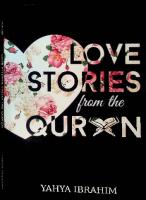Love Stories from the Qur'an 9672420269, 9789672420262
All of the love stories from the Quran have the connotation of birr, of protection, of qawwam, of endearment, of sacrifi
3,866 168 3MB
English Pages 134 Year 2020
Recommend Papers

- Author / Uploaded
- Yahya Adel Ibrahim
File loading please wait...
Citation preview
-I
'J
■A
1
ft?
Hi) 10 -H
0. z>
S' in ip
z O'
broi
■:r'
J H
I
m 0 c z >
y
zJ ■
7
RXN
J ?
?
YAHYA IBRAHIM
© Yahya Ibrahim 2020 All rights reserved. No part of this book may be reproduced, printed, or electronically shared without permission from the publisher.
ISBN: 978-967-2420-26-2 First Edition: June 2019 Second Edition: June 2020
For inquiry, please contact: Tertib Publishing 23-2 Jalan PJS 5/30 Petaling Jaya Commercial City (PJCC) 46150 Petaling Jaya, Selangor Malaysia Tel: +603-7772-3156/ +6013-399-8837 Email: [email protected]
Website: www.tertib. press
Cover design: Miza Mumtaz Editor: Dahlia Abdul Latiff Typesetting & Layout: Ainul Syuhada Printed by: Firdaus Press Sdn. Bhd.
ConMfr Love Stories from the Quran
1
The First Love Story: Adam (a.s.) & Hawwa
9
Love & Beautiful Patience: Yusuf (a.s.)
17
Love & Sacrifice: Ayyub (a.s.)
27
Love & Tests: Dawud (a.s.)
38
The Love of a Kingdom: Sulayman (a.s.)
50
Love & Honesty: Musa (a.s.)
56
Love in the Long Distance: Ibrahim (a.s.)
63
The Love of the Two Mothers: Musa (a.s.)
71
The Love of a Father: Luqman Al-Hakim
85
The Love for a Lost Son: Nuh (a.s.)
96
Love: True or False: Qabil & Habil
104
The Love of a Husband & Wife: Ibrahim (a.s.) & Sarah
112
The Love for the Ummah: Zakariyya (a.s.)
118
[we 8twy (i^n the Ojirau
Preface' With the Name of Allah and after the choicest benedictions and salutations upon the final Messenger of Allah Muhammed Sala Allahu alihi wasSalaam.
The Qur an is not a storybook of wondrous tales and ancient fables, isolated from the realities and complexities of real life. Each verse, in fact, each letter is miraculously precise in meaning, succinct in message and pure in sound.
iv
‘Ali radyAllahu anhu came home one day from a journey that he had been dispatched on by the Prophet Muhammed sallallahu alayhi wa sallam, to find his wife,
Fatima, the daughter of the Prophet, radiya Allahu anha brushing her teeth with a siwak - twig of an Arak (Salvadora persica) tree used for brushing teeth. Spontaneously, he, radyAllahu ‘anhu, spouted out poetic endearment:
2J1J Jlljb
jJlj— 1)1J—/ L
U ...
jli L» ... Ajjjj
b
> b “4/^ cfc jl
Fortunate are you O twig of the Arak tree,
Have you no fear of me observing you in this embrace
[wc gtorto(I'oifi the Qjuwi
If it were other than you...O Siwak! I would have killed you!
None found thisfortune of embrace before me, but you..
Love. The real kind - the genuine love between a man and his wife that stems from a seed of love that is planted by Allah in the hearts of those who are true in submission to the Dispenser of Love and Comfort.
A seed, literally and figuratively, in Arabic symbolizes love. Houb in Arabic is derived from the same root for the word Haab - seed. The nature of the two words is functionally similar.
Love begins as a tiny speck - a seed that is buried deep in the folds of a receptive heart, carrying the potential of stunning beauty, nourishing sustenance, exotic delicacy, wealth of commodity, shading shelter, and resurgent growth that is stabilized through deep roots that withstand trauma. The aim of this book is to connect us to the Quran and to Allah by extension of Love.
The Quran is Arabic. Translations are the work of beings seeking to comprehend and render in their own words a description of what that Word means to them. The beauty of the Quran is multidimensional and inimitable.
v
I
[OVC Slot'y [i'OIH tltc 0.111'0/1
It is important to note that many Quranic verses establish men and women inclusively in the broad terms of “human being” or “people” (insan, nas). Although these words are masculine pronouns in Arabic, and translate to “man,” “mankind,” or “men,” they are gender-neutral in the original Arabic and apply to women as much as they do to men. It is important to also keep in mind that when a group includes both Muslim men and Muslim women they are referred to with the male form collective noun muslimun. In most cases it refers to all Muslims, irrespective of gender. vi
This is an important clarification for those who can only access the Quran as a translation or are confronted with a male centric English translation that does not reflect the reality of the Quran in its original Arabic. Where the Quran mentions men and women separately, it is clear and unambiguous.
The Quran’s basic stance is that Muslim men are the religious equals of Muslim women. They assist and protect one another: Anyone, male or female, who does good deeds and is a believer, will enter Paradise and will not be wronged by as much as the dip in a date stone. (Quran: 4:124)
The believers, both men and women, support each
I_wc Stories front the Qjtran
other; they order what is right and forbid what is wrong; they keep up the prayer and pay the prescribed alms; they obey God and His Messenger. God will give His mercy to such people: God is almighty and wise. (Quran 9:71) The Quran describes the Muslim marriage in terms of love and mercy interchanged between two separate but equal parts that come into one another:
It is He who created you all from one soul, and from it made its mate so that he might find comfort in her: when one [of them] lies with his wife and she conceives a light burden, going about freely, then grows heavy, they both pray to God, their Lord, "If You give us a good child we shall certainly be grateful,’ (Quran 7:189) Another of His signs is that He created spouses from among yourselves for you to live with in tranquillity: He ordained love and kindness between you. There truly are signs in this for those who reflect. (Quran 30:21)
A pray that these words build love for us and between us and make us true in our love.
In need of your sincere dua, Yahya Adel Ibrahim
Perth, Western Australia
vii
'









